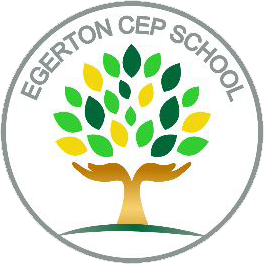Mathematics
What is Mathematics?
Mathematics is the subject that deals with the logic of shape, quantity and arrangement.
Mathematics provides an effective way of building mental discipline and encourages logical reasoning and mental rigor. It is the building block for everything in our daily lives, including mobile devices, computers, software, architecture (ancient and modern), art, money, engineering and even sports. In addition, mathematical knowledge plays a crucial role in understanding the contents of other school subjects such as science, computing, music and art. In short, maths is all around us, in everything we do.
Intent
At Egerton, the firm belief that all children have the potential to succeed is at the centre of our approach to the teaching of mathematics. We believe that all children need a deep understanding of the mathematics they are learning so that future mathematical learning is built on solid foundations.
We strive to ensure that all pupils are able to:
-
Use mathematical concepts, facts and procedures appropriately, flexibly and fluently
-
Recall key number facts with speed and accuracy and use them to calculate and work out unknown facts
-
Have sufficient depth of knowledge and understanding to reason and explain mathematical concepts and procedures and use them to solve a variety of problems
-
Solve problems of greater complexity (i.e. where the approach is not immediately obvious), demonstrating creativity and imagination
-
Independently explore and investigate mathematical contexts and structures, communicate results clearly and systematically explain and generalise the mathematics.
Implementation
Teaching at Egerton is underpinned by careful curriculum design and supported by carefully crafted lessons and resources to foster deep conceptual and procedural knowledge.
Our school's scheme of work is a working document and as such is composed of:
-
Long Term Overviews, following the 2022 White Rose Mathematics Curriculum for Year R to Year 6, exemplifying the breadth of coverage across each year group.
-
Medium term plans, following the 2022 White Rose Blocks. These plans progressively cover the Programme of Study as set out in the Maths Curriculum 2014 for each year group.
-
Ongoing teachers' plans produced on a week by week basis and reviewed daily as necessary. These are developed from the Medium Term plans, taking into consideration the needs of our children. They are based on the varied approach as outlined by White Rose Mathematics.
-
Teachers in the Early Years Foundation Stage base their teaching and learning on objectives within the Framework for Foundation Stage; this ensures that they are working towards the ‘Early Learning Goals For Mathematical Development’. Towards the end of the Foundation Stage, teachers aim to draw the elements of a daily mathematics lesson together so that by the time children move into Year 1 they are familiar with a 45-minute lesson.
Impact
The Maths curriculum ensures that the needs of all pupils including SEND and disadvantaged, and small groups of vulnerable children, can be met within the environment of high quality teaching supported by targeted interventions where appropriate. In this way it can be seen to be impacting in a very positive way on pupil outcomes and prepares them for the next phase in school.
At Egerton, we value the importance of developing the children’s knowledge, together with their skills. As a result, by the time our children leave Egerton they are well prepared for secondary school.
Maths Curriculum
Why White Rose?
The reasons we chose the White Rose Maths Primary Curriculum can be summarised by the following points:
- It provides a powerful CPA approach (concrete, pictoral, then abstract) including in its use of models and images, which helps secure pupils understanding of mathematics and to make connections between different representations.
- There is a great emphasis on mathematical language, questioning, explaining, reasoning and problem solving. This allows pupils to discuss the mathematics they are doing, support each other to take ideas further, and develop a broad and secure understanding.
- It provides a connected, progressive curriculum, aiding the development of carefully sequenced lessons, (See more below on progression within the scheme).
- It develops the skills of teachers, without interfering with professional judgement by being over prescriptive.
- The curriculum is designed to use skills that have already been learnt in different contexts (sometimes called ‘interleaving’) whenever possible. This helps pupils to remember and to make connections between different parts of the curriculum.
- It combines the best of both ‘mastery’ and ‘spiral’ approaches in the curriculum. It follows many of the mastery principles – spending longer on topics to help gain deeper understanding, making connections, keeping the class working together on the same topic and a fundamental belief that, through effort, all pupils are capable of understanding, doing and improving at mathematics. But also recognising that just spending a good chunk of time on a topic doesn’t mean that all pupils will ‘master’ it the first time they see it, and that they need to see it again and again in different contexts and in different years to help them truly develop their understanding on their journey to mastery, so we’ve built in the revisiting and reinforcing features of spiral curricula too.
- It is a curriculum that is ambitious and that works for all, with everybody studying the same topic and being provided with support and challenge as needed. Many of the teaching strategies we advocate for all pupils are particularly useful for pupils with SEND.
